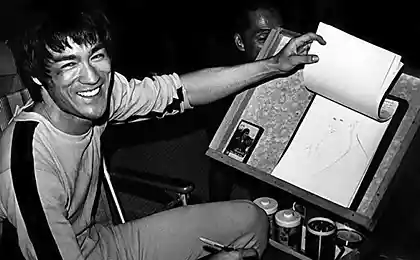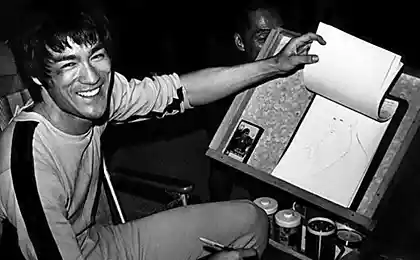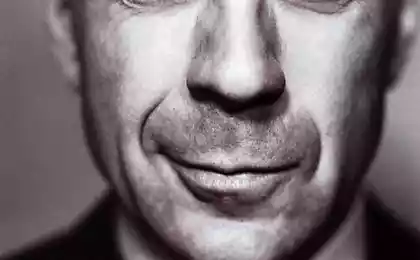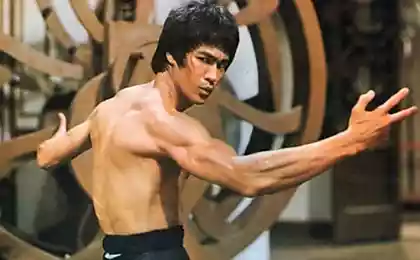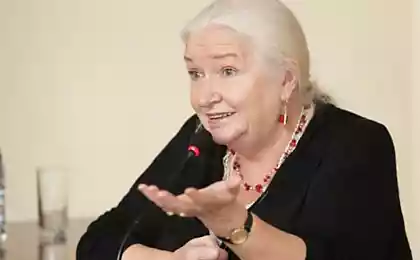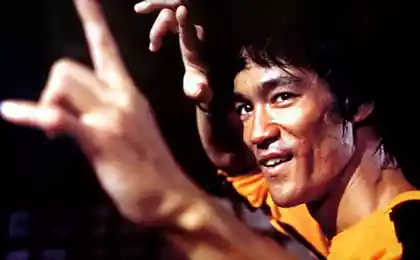869
Bruce hood: What makes us human
Bruce hood is a Professor of University of Cambridge and Harvard, a recognized expert in developmental psychology with a great knowledge in the field of neuroscience. He wrote a book, "the domesticated Brain: What makes us human?", which sends the reader in the depths of the ocean in search of mindless creatures, then throws in a few million years in the past, then opens the skull, gives to consider in the electron microscope the process of forming new neural connections.

But often it opens the door for us on the street, asking passers-by to take a look at, to look with fresh eyes at their relationships with family, friends and yourself.
"The domesticated brain" — one of the representatives of the scientific and popular literature that makes you want after each Chapter to slap yourself on the knee and shout (at least mentally), "Oh, you're right!". And when you are finished reading the book, rest assured, you will feel the unique representative not less unique the human race.

The amazing in the familiar: each of us is amazing for its ability almost from birth to make social connections and to interpret them.Bruce proves and shows that it is not just the ability, the need and the driving force of our development. Sounds idealistic, but the value of each human person lies in its ability to find a place among others and to benefit society. Without this it is impossible not only to full personal development; without this it would be impossible the development of civilization, language and culture as such. This may seem quite banal tenets, but supported by the data of numerous studies in neurobiology, anthropology, sociology and psychology of development, they acquire a special meaning.
What the brain is?
The brain cost the person dearly: he is only 1/50 of body weight, but consumes up to 1/5 of all energy. By the way, this "only" is very conditional, because relative to the size of our body we have a very large brain. At birth our brain is twice more than the chimpanzee brain. And its value always represented a special danger during childbirth. It may be particularly difficult childbirth eventually led to the invention of obstetrics, which became one of the impetus for the development of civilization and society. Nobody on this planet except the people who did not assist the woman in labor, and who knows, maybe birth became the prototype of social cooperation and mutual aid characteristic of human culture in General.
We may have built a computational machine that can beat any chess champion, but we are still far from developing a computer that would be able to recognize and choose any of the chess pieces with the same ease with which it makes the usual three.
Among the variety of life forms on our planet can be seen beings who can manage without a brain — for example, a small inhabitant of the ocean ascidia. She has a rudimentary education for coordination, but it's worth it to find a nice stone, and to cleave unto him, from the brain it is immediately freed, because it is very expensive pleasure.
Here it is, a mindless colony of ascidians.
Fortunately for us, the world does not consist of one ascidians, and nature for hundreds of millions of years of experimenting with life on Land, bringing increasingly advanced forms, consolidating the successful experiments in the genetic code and allowing to transfer the experience to the next generation through DNA molecules. All life that we see around us — just different types of vessels for DNA. One of the modern versions regarding the evolution of the brain, the first impulse to its development was the need for orientation in space. A need for this was dictated by the General law of ruthless natural selection:
He who does not want to become food for others, should be able to fight back or escape.This mechanism is really almost pitiless: according to some estimates, of all the types of life that existed on earth over the last 3 billion years, today remained only 0.1%. This is the brain that allowed sentient beings to accumulate experience, to analyze it, save in the future to react to danger more quickly and make your mark in the DNA of their descendants.
Still, he is reduced
The process of selective breeding of animals and plants (that is nothing like artificial selection) gave Charles Darwin considerable part of the arguments to construct a theory of the origin of species. Man, as soon as mastered agriculture and livestock, constantly "set up" the existing species of flora and fauna for themselves, changing their characteristics and behavior, domashneva them. It is surprising that domesticated animals changed not only the body but also the brain.
The brain of each of the approximately 30 animals domesticated by humans have decreased in volume by 10-15% compared with their wild ancestors — about the same reduction in brain observed in the last thousand generations of humans.
Amazing, isn't it? After all, we always thought that as the evolutionary development of the hominid brain became larger, until it has acquired a modern volume. However, studies show that since then, as people moved from ochotnicza to a settled way of life (roughly speaking, as long as there are the first signs of civilization and culture), his brain began to decrease.
Why decreases the brain?
Domashneva animals, we strive to develop in them humility and to eliminate the aggression, to make them easier to grow and breed. Aggressive and dominant behavior in animals is associated with testosterone, which in addition affects the size of the organs of the body (e.g., makes the muscles bigger and stronger). It is the effect of testosterone may explain the larger brain in wild animals compared to Pets. There are other amazing discoveries about the behavior of domestic and wild animals. For example, wolves solve problems and complex tasks differently than domesticated dogs. Wolves use cunning and persistent in his desire to obtain the reward; the dogs give up faster and tend to turn to the master for help. This is the real social skills that help to enlist the support of other creatures, not to fight the problem alone.
So the brain of domestic animals has decreased as they were exposed to artificial selection. Human breeding process from outside are not concerned, therefore, we can say that humanity "has slotmachines", independently changing its species.
The appearance of Lucy, the first known representative of the hominids. Lucy lived on our planet for over 3 million years ago.
If the animals in the process domashneva clearly gained some social features, resulting in has changed, and their brain, can we assume that the brain of hominids has changed considerably thanks to emerging social relationships, principles of cooperation and group activities? As it turns out, Yes.
Have people other people do
Moreover, you can make another stunning discovery. We used to believe that civilization arose because of the increasing wisdom of man and the progressive changes in his brain. But it isn't the man became civilized thanks to the development of the brain, and the brain was changing due to the emergence of collective intelligence. The ability to survive depends on what we learn from other people. So human society is a serious, if not the main, tool of artificial selection.
Civilization began when cooperation and knowledge transfer outweighed by the effectiveness of competition and the use of force.That is why this value has to folklore, centuries of accumulated folk knowledge and recipes. Every stage of development of the history of knowledge that needed to be passed from generation to generation, became bigger and harder. Prolonged in comparison with the animal world the period of human childhood is due not only to physiological need in the formation of the body, but also a social one: the transfer of the mass of accumulated knowledge. Most likely, this is why Romeo and Juliet was able to lead a very adult life at the age of 14; and in the modern age people are 14 years of age are perceived by another are children. This is all the consequences of the need to transmit a huge base of accumulated information.
Our brain as a result of evolution became public.
From childhood there is another important point: children learn to be people. In childhood we continually domashneva itself through the mechanisms of the copying, recognition and interpretation of actions and emotions of others, watching adults behave, learn to guess the public's expectations and meet them. It's an acquired evolutionary built into us the ability to learn the culture, "gene culture", if you want.
Here the mechanisms of research and copying in action. Frame from the documentary "Babies" by Thomas Balmes.
Language is an amazing phenomenon, inherent only in human beings, also emerged for this reason: the increasing need to transmit information to each other in unlimited amounts, relating it to past experience and making projections for the future. Some animals, too, own signaling system, but their "communication" is associated with four major topics: flight, fight, food and mating.
Whatever was shown on the screen Walt Disney and other animators, communication of animals is limited to a set, sometimes quite complex, the signals for transmission following the four simple messages:
The Association of people is not limited to topics of survival and reproduction (although we also pay enough attention in conversations). We can talk about the weather, to give advice, to share scientific information, but more than anything we love to talk about others. We are evolutionarily inclined to communicate: for example, infants from birth are configured to communicate with the mother.
The human brain was used to living in a group, learn to communicate with others, to participate in the culture and transmission of cultural heritage. Hence the emergence of language as means of communication and the long period of childhood, and an amazing ability to think about what others think about us.
We all know how to read minds
The human brain is unique not for its size. It is unique and absolutely special type of operations performed, are not found in any species in nature. It is also the skills of orientation, but orientation is not in space but in society. Communicating with people may seem simple, but in communication with other people, determining their intentions, decision-making about collaboration, our brain works to limit their possibilities.
A person needs to be able to read others — because it belongs to a species which is acquired in the course of evolution the ability to coexist and, more importantly, to cooperate. These skills will also come in handy if you are in the light of helpless babies that need care and attention of the elders.
This is our evolutionary inherent desire to communicate in the group and to obtain approval from it can explain the mysterious phenomenon of altruism.
Seriously, personal gain for the sake of others not willing to sacrifice more than any other type (except for the chaotic attempts of Pro-social interactions in monkeys).We want to help others and cooperate with them, if it helps us to feel connected with the group. We constantly evaluate our social relationships and the social environment, which is changing every minute. This is much harder than orientation in the physical environment. It is in order to live in human society, and the required computing power of the brain that we have. Not to build a rocket, and in order to transmit to our descendants the knowledge.
A fragment of the first scan Sengamala the altar of Matthias grünewald.
Then, as the small child keeps track of the subtle nuances of human interaction — is truly amazing. Children, not yet able even to crawl, accurately distinguish a moving human from a moving inanimate object, although they are even more unfamiliar the concept of "man". The gesture of the index finger, inviting you to look at something interesting, is also exclusively a human invention. Only people important to joint attention and the opportunity to share their discoveries and observations with others. Only to people it is important to get feedback on their actions from others. Moreover, if in the early stages of development the child does not receive a positive response from the people to whom he is bound, if any, isolated from human society, their physiology of the hypothalamic-pituitary-adrenal system will be forever destroyed — usually, this means an impaired ability to overcome stress and constant tension.
From the very beginning of our lives we need someone close. The growth we are expanding your social circle and with it the number of our neural connections. This is the main lesson of "the Domesticated brain": the man and his powers appear not so much with a frozen set of knowledge, and through meaningful interaction with society.
Also interesting: the Brain and Happiness: How to change your feelings and behavior
We have become lazy and economical in communications and mental emotion...
This is confirmed by the conducted social and psychological experiments and neurobiological studies. And the most meticulous of you can learn more about this, read the book completely.
P. S. And remember, just changing your mind — together we change the world! ©
Source: newtonew.com/overview/book-club-domesticated-brain

But often it opens the door for us on the street, asking passers-by to take a look at, to look with fresh eyes at their relationships with family, friends and yourself.
"The domesticated brain" — one of the representatives of the scientific and popular literature that makes you want after each Chapter to slap yourself on the knee and shout (at least mentally), "Oh, you're right!". And when you are finished reading the book, rest assured, you will feel the unique representative not less unique the human race.

The amazing in the familiar: each of us is amazing for its ability almost from birth to make social connections and to interpret them.Bruce proves and shows that it is not just the ability, the need and the driving force of our development. Sounds idealistic, but the value of each human person lies in its ability to find a place among others and to benefit society. Without this it is impossible not only to full personal development; without this it would be impossible the development of civilization, language and culture as such. This may seem quite banal tenets, but supported by the data of numerous studies in neurobiology, anthropology, sociology and psychology of development, they acquire a special meaning.
What the brain is?
The brain cost the person dearly: he is only 1/50 of body weight, but consumes up to 1/5 of all energy. By the way, this "only" is very conditional, because relative to the size of our body we have a very large brain. At birth our brain is twice more than the chimpanzee brain. And its value always represented a special danger during childbirth. It may be particularly difficult childbirth eventually led to the invention of obstetrics, which became one of the impetus for the development of civilization and society. Nobody on this planet except the people who did not assist the woman in labor, and who knows, maybe birth became the prototype of social cooperation and mutual aid characteristic of human culture in General.
We may have built a computational machine that can beat any chess champion, but we are still far from developing a computer that would be able to recognize and choose any of the chess pieces with the same ease with which it makes the usual three.
Among the variety of life forms on our planet can be seen beings who can manage without a brain — for example, a small inhabitant of the ocean ascidia. She has a rudimentary education for coordination, but it's worth it to find a nice stone, and to cleave unto him, from the brain it is immediately freed, because it is very expensive pleasure.
Here it is, a mindless colony of ascidians.
Fortunately for us, the world does not consist of one ascidians, and nature for hundreds of millions of years of experimenting with life on Land, bringing increasingly advanced forms, consolidating the successful experiments in the genetic code and allowing to transfer the experience to the next generation through DNA molecules. All life that we see around us — just different types of vessels for DNA. One of the modern versions regarding the evolution of the brain, the first impulse to its development was the need for orientation in space. A need for this was dictated by the General law of ruthless natural selection:
He who does not want to become food for others, should be able to fight back or escape.This mechanism is really almost pitiless: according to some estimates, of all the types of life that existed on earth over the last 3 billion years, today remained only 0.1%. This is the brain that allowed sentient beings to accumulate experience, to analyze it, save in the future to react to danger more quickly and make your mark in the DNA of their descendants.
Still, he is reduced
The process of selective breeding of animals and plants (that is nothing like artificial selection) gave Charles Darwin considerable part of the arguments to construct a theory of the origin of species. Man, as soon as mastered agriculture and livestock, constantly "set up" the existing species of flora and fauna for themselves, changing their characteristics and behavior, domashneva them. It is surprising that domesticated animals changed not only the body but also the brain.
The brain of each of the approximately 30 animals domesticated by humans have decreased in volume by 10-15% compared with their wild ancestors — about the same reduction in brain observed in the last thousand generations of humans.
Amazing, isn't it? After all, we always thought that as the evolutionary development of the hominid brain became larger, until it has acquired a modern volume. However, studies show that since then, as people moved from ochotnicza to a settled way of life (roughly speaking, as long as there are the first signs of civilization and culture), his brain began to decrease.
Why decreases the brain?
Domashneva animals, we strive to develop in them humility and to eliminate the aggression, to make them easier to grow and breed. Aggressive and dominant behavior in animals is associated with testosterone, which in addition affects the size of the organs of the body (e.g., makes the muscles bigger and stronger). It is the effect of testosterone may explain the larger brain in wild animals compared to Pets. There are other amazing discoveries about the behavior of domestic and wild animals. For example, wolves solve problems and complex tasks differently than domesticated dogs. Wolves use cunning and persistent in his desire to obtain the reward; the dogs give up faster and tend to turn to the master for help. This is the real social skills that help to enlist the support of other creatures, not to fight the problem alone.
So the brain of domestic animals has decreased as they were exposed to artificial selection. Human breeding process from outside are not concerned, therefore, we can say that humanity "has slotmachines", independently changing its species.
The appearance of Lucy, the first known representative of the hominids. Lucy lived on our planet for over 3 million years ago.
If the animals in the process domashneva clearly gained some social features, resulting in has changed, and their brain, can we assume that the brain of hominids has changed considerably thanks to emerging social relationships, principles of cooperation and group activities? As it turns out, Yes.
Have people other people do
Moreover, you can make another stunning discovery. We used to believe that civilization arose because of the increasing wisdom of man and the progressive changes in his brain. But it isn't the man became civilized thanks to the development of the brain, and the brain was changing due to the emergence of collective intelligence. The ability to survive depends on what we learn from other people. So human society is a serious, if not the main, tool of artificial selection.
Civilization began when cooperation and knowledge transfer outweighed by the effectiveness of competition and the use of force.That is why this value has to folklore, centuries of accumulated folk knowledge and recipes. Every stage of development of the history of knowledge that needed to be passed from generation to generation, became bigger and harder. Prolonged in comparison with the animal world the period of human childhood is due not only to physiological need in the formation of the body, but also a social one: the transfer of the mass of accumulated knowledge. Most likely, this is why Romeo and Juliet was able to lead a very adult life at the age of 14; and in the modern age people are 14 years of age are perceived by another are children. This is all the consequences of the need to transmit a huge base of accumulated information.
Our brain as a result of evolution became public.
From childhood there is another important point: children learn to be people. In childhood we continually domashneva itself through the mechanisms of the copying, recognition and interpretation of actions and emotions of others, watching adults behave, learn to guess the public's expectations and meet them. It's an acquired evolutionary built into us the ability to learn the culture, "gene culture", if you want.
Here the mechanisms of research and copying in action. Frame from the documentary "Babies" by Thomas Balmes.
Language is an amazing phenomenon, inherent only in human beings, also emerged for this reason: the increasing need to transmit information to each other in unlimited amounts, relating it to past experience and making projections for the future. Some animals, too, own signaling system, but their "communication" is associated with four major topics: flight, fight, food and mating.
Whatever was shown on the screen Walt Disney and other animators, communication of animals is limited to a set, sometimes quite complex, the signals for transmission following the four simple messages:
- "Attention, danger";
- "Stay away, man, I can tell you";
- "Come and take the food"
- or (probably even more): "Come and take it, ladies, I'm here."
The Association of people is not limited to topics of survival and reproduction (although we also pay enough attention in conversations). We can talk about the weather, to give advice, to share scientific information, but more than anything we love to talk about others. We are evolutionarily inclined to communicate: for example, infants from birth are configured to communicate with the mother.
The human brain was used to living in a group, learn to communicate with others, to participate in the culture and transmission of cultural heritage. Hence the emergence of language as means of communication and the long period of childhood, and an amazing ability to think about what others think about us.
We all know how to read minds
The human brain is unique not for its size. It is unique and absolutely special type of operations performed, are not found in any species in nature. It is also the skills of orientation, but orientation is not in space but in society. Communicating with people may seem simple, but in communication with other people, determining their intentions, decision-making about collaboration, our brain works to limit their possibilities.
A person needs to be able to read others — because it belongs to a species which is acquired in the course of evolution the ability to coexist and, more importantly, to cooperate. These skills will also come in handy if you are in the light of helpless babies that need care and attention of the elders.
This is our evolutionary inherent desire to communicate in the group and to obtain approval from it can explain the mysterious phenomenon of altruism.
Seriously, personal gain for the sake of others not willing to sacrifice more than any other type (except for the chaotic attempts of Pro-social interactions in monkeys).We want to help others and cooperate with them, if it helps us to feel connected with the group. We constantly evaluate our social relationships and the social environment, which is changing every minute. This is much harder than orientation in the physical environment. It is in order to live in human society, and the required computing power of the brain that we have. Not to build a rocket, and in order to transmit to our descendants the knowledge.
A fragment of the first scan Sengamala the altar of Matthias grünewald.
Then, as the small child keeps track of the subtle nuances of human interaction — is truly amazing. Children, not yet able even to crawl, accurately distinguish a moving human from a moving inanimate object, although they are even more unfamiliar the concept of "man". The gesture of the index finger, inviting you to look at something interesting, is also exclusively a human invention. Only people important to joint attention and the opportunity to share their discoveries and observations with others. Only to people it is important to get feedback on their actions from others. Moreover, if in the early stages of development the child does not receive a positive response from the people to whom he is bound, if any, isolated from human society, their physiology of the hypothalamic-pituitary-adrenal system will be forever destroyed — usually, this means an impaired ability to overcome stress and constant tension.
From the very beginning of our lives we need someone close. The growth we are expanding your social circle and with it the number of our neural connections. This is the main lesson of "the Domesticated brain": the man and his powers appear not so much with a frozen set of knowledge, and through meaningful interaction with society.
Also interesting: the Brain and Happiness: How to change your feelings and behavior
We have become lazy and economical in communications and mental emotion...
This is confirmed by the conducted social and psychological experiments and neurobiological studies. And the most meticulous of you can learn more about this, read the book completely.
P. S. And remember, just changing your mind — together we change the world! ©
Source: newtonew.com/overview/book-club-domesticated-brain





